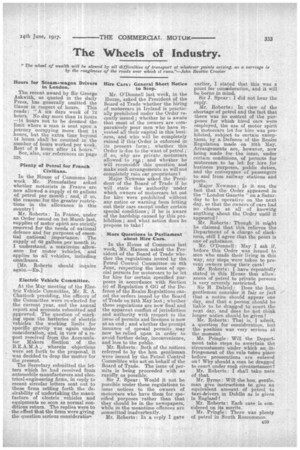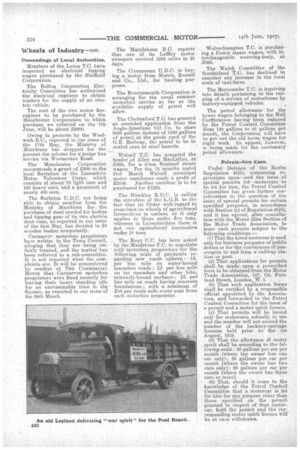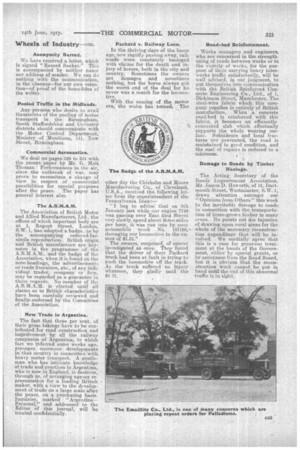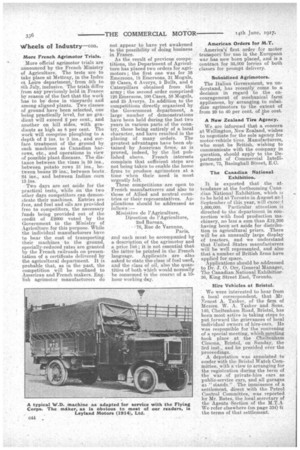The Wheels of Industry.
Page 9

Page 10

Page 11

Page 12

If you've noticed an error in this article please click here to report it so we can fix it.
" The wheel of wealth will be slowed by all difficulties of transport at whatever points arising, as a carriage is by the roughness of the roads over which et runs."—John Beattie Crozier Hours for Steam-wagon Drivers in London.
The recent award by Sir George Askwith, as quoted in the daily Press, has generally omitted the elause in respect of hours. This reads : "A six days week of 72 hours. No day more than 14 hours —14 hours not to be deemed the limit where a man is sent upon a journey occupying more than 14 hours, but the extra time beyond 14 hours shall be counted in the number of hours worked per week. Rest of 9 hours after 14 hours."
See, also, our references on page 328.
Plenty of Petrol for French Civilians.
In the House of Commons last week Mr. Pennefather asked whether motorists in France are now allowed a. supply ol.60 gallons of petrol per month ; and, if so, the reasons for the greater restrictions in the allowance in this country ?
Mr. Roberts : France, under an Order issued on 1st March last, supplies of motor spirit are strictly reserved for the needs of national defence and for purposes of essential national importance. The supply of 60 gallons per month is; I understand, a maximum allowance for motor vehicles, and applies to all vehicles, including omnibuses.
[Mr. Roberts should inquire again.—En.] Electric Vehicle Committee.
At the May meeting of the Electric Vehicle Committee, Mr. R. A. Chattock presiding, the officers of the Committee were re-elected for the current year, and the annual report and accounts submitted and approved. The question of markUtg upon the batteries of electric vehicles the working limits for specific gravity was again under consideration, and, in view of a report received from the Accumulator Makers Section of the B.E.A.M.A., wherein objections were set forth to the proposal, it was decided to drop the matter for the present.
The Secretary submitted the letters which he had received from automobile manufacturers and electrical-engineering firms, in reply to recent circular letters sent out to these firms setting forth the desirability of undertaking the manufacture of electric vehicles and equipments so soon as normal conditions return. The replies were to the effect that the firms were giving the question serious consideration Hire Cars: General Short Notice to Stop.
Mr. O'Donnell last week, in the House, asked the President of the Board of Trade whether the hiring of motorcars in Ireland is practically prohibited under the Order recently issued; whether he is aware that most of the owners are comparatively poor men who have in vested all their capital in this busi. ness, and who will be completely ruined if this Order is enforced in its present form ; whether this Order is due to the want of petrol ;' if so, why are private motorcars allowed to ; and whether he will reconsider this question and make such arrangements as will not completely ruin car proprietors? Major Newman asked the President of the Board of Trade if he will state the authority under which owners of motorcars let out for hire were prohibited without any notice or warning from letting out their cars except under certain special conditions ; if he is aware of the hardship caused by this prohibition; and what action does he propose to take?
'More Questions in Parliament ' about Hire Cars.
In the House of Commons last week, Mr. Hanson asked the President of the Board of Trade whether the regulations issued by the Petrol Control Committee on 6th June, respecting the issue of special permits for motorcars to be let for hire for certain specified purposes in accordance with Section (c) of Regulation 8 GG of the Defence of the Realm Regulations cancel the orders issued by the Board of Trade on 24th May last ; whether these regulations are now final and the apparent conflict of jurisdiction and authority with respect to the issue of permits and licences is now at an end ; and whether the prompt issuance of special permits may now be relied upon in order to avoid further delay, inconvenience, and loss to the public.
Mr. Roberts : Both of the notices referred to by the hon. gentleman. were issued by the Petrol Control Committee who act on behalf of the Board of Trade. The issue of permits is being proceeded with as rapidly as possible.
Sir J. Spear : Would it not be possible under these regulations to issue notices to the owners of motorcars who have them for specified purposes -rather than that they should be in the newspapers, while in the meantime offences are committed inadvertently.
Mr. Roberts : In a reply I gave earlier, I stated that this was a point for consideration, and it will be borne in mind.
Sir J. Spear : I did not hear the reply.
Mr. Roberts : In view of the shortage of petrol and the fact that there was no control of the purposes for which hired cars were employed, the use of motor spirit in motorcars let for hire was prohibited, subject to certain exceptions, by a, Defence of the Realm Regulation made on 10th May. Arrangements are, however, now being made for the issue, under certain conditions -of permits for motorcars to be let for hire for business purposes, public duties, and the conveyance of passengers to and from railway stations and ports.
Major Newman : Is it not the fact that the Order appeared in the "London Gazette" on a Saturday to be operative on the next day, so that the owners of cars had no chance at all of knowing anything about the. Order until it appeared?
Mr. Roberts: Though it might be claimed that this relieves the Department of a charge of slackness, still I agree that the point is one of substance.
Mr. O'Donnell : May I ask if, before this Order was issued to men who made their living in this way, any steps were taken to prevent owners using their ears?
Mr. Roberts : I have repeatedly _ stated in this House that allowances of petrol to private persons is very severely restricted.
Sir H. Dalziel : Does the hon. gentleman consider it fair or just that a notice should appear one day, and that a person should be liable to be dragged to court the next day, and does he not think longer notice should be given? MT. Roberts : That is, I admit, a question for consideration, but the position was very serious at the moment.
Mr. Pringle : Will the Department take steps to ascertain the 'circumstances under which an infringement of the rule rakes place before prosecutions are entered on ? Why should a man be dragged to court under such circumstances? Mr. Roberts : I shall take note of that.
Mr. Byrne : Will the hon. gentleman give instructions to give an equivalent amount of petrol to taxi-drivers in Dublin as is given in England?
Mr. Roberts : Each case is considered on its merits.
Mr. Pringle: There was plenty of petrol in South Roscommon. Proceedings of Local Authorities.
Members of the Luton T.C. have inspected an electrical tipping wagon purchased by the Sheffield Corporation.
The Bolton Corporation Electricity Committee has authorized the electrical engineer to obtain tenders for the supply of an electric vehicle.
The cost of the two motor fireengines to be purchased by the Manchester Corporation to which purchase we referred on the 7th June, will be about £2300.
Owing to protests by the Woolwich B.C., reported in our issue of the 17th May, the Ministry of Munitions has dropped for the present the scheme for a motor bus service via Westmount Road.
The Manchester Corporation recommends a grant of 2250 to. the local Battalion of the, Lancashire Motor Volunteer Corps, which consists of about 70 light cam and 130 heavy cars, and a personnel of nearly 400 men.
The Surbiton U.D.C. not being able to obtain sanction from the Ministry of Munitions for the purchase of steel needed for bodies and tipping gear of its two electric dust vans, as reported in our issue of the 31st May, has decided to fit wooden bodies temporarily.
Carnarvo-% motorbus proprietors have writtes to the Town Council, alleging that they are being unfairly, treated, and the matter has been referred to a sub-committee. It is not reported what the complaints are. It will be remembered by readers of THE COMMERCIAL MOTOR that Carnarvon motorbus proprietors were fined recently for leaving their buses standing idle for an unreasonable time in th#e" Square, as reported in our issue of the 29th March. The Marylebone B.C. reports that one of its Laffiey motor sweepers covered 1283 miles in 25 days.
The Cirencester U.D.C. is buying a motor from Morris Russell and Co., Ltd., for hauling purposes.
The Bournemouth Corporation is arranging for the usual summer motorbus service as far as the available supply of petrol will allow.
The Chelmsford T.C. has granted an amended application from the Anglo-American Oil Co. to store 3000 gallons instead of 1500 gallons of petrol at the goods yard of the G.E. Railway, the petrol to be in sealed cans or steel barrels.
Walsall T.C. has accepted the tender .of Alley and MacLellan, at 2825, for a 4-ton Sentinel steam wagon. For the 15 months ended 31st March Walsall municipal motor omnibuses made a profit of 23146. Another omnibus is to be purchased for £1224.
The Hinckley R.D.C. is calling the attention of the L.G.B. to the fact that its Order with regard to cross-bars on wheels of agricultural locomotives is useless, as it only applies to those under five tons, whereas in Leicestershire there is not one agricultural locomotive under 18 tons.
The. Kent C.C. has been asked by the Maidstone T.C. to negotiate with motorbus proprietors for the following scale of payments regarding new roads upkeep : • Id. per bus mile on water-bound macadam roads ; id. per bus mile on tar macadam and other bite, miectisly-bound surfaces ; id. peil bus mile on roads having concrete foundations • with a minimum of 210 per route mile every year from each motorbus proprietor.
Wolverhampton T.C. is purchasing a Foden steam wagon, with interchangeable watering-body, at 2895.
The Watch Committee of the Sunderland T.C. has declined to sanction any increase in the local scale of taxi-fares.
The Morecambe T.C. is inquiring into details pertaining to the rimning of a service of motorbuses by battery-equipped vehicles.
The petrol allowance for the tower wagen belonging to the Hull CorVoration having been reduced by the Petrol Control Committee from 132 gallons to 88 gallons per month, the ConSoration will have to get out the' old horse wagon for night work. An appeal, •Ilowever, is being made for the customary petrol allowance.
Private-hire Cars'.
Under' Defence of the Realm Regulation 8GG, concerning reOrictions upon—and the issue of special permits for—motorcars to be let for hire, the Petrol Control Committee has given further consideration to the question of the issue of special permits for certain specified purposes, in accordance with Section (c) of Regulation 8GG, and it has agieed, after consultation with the Motor Hire Section of the Motor .Trade Association, to issue such permits subject to the following conditions :— (1) That the hired motorcar is used only for business purposes or'pu.blie duties or for the conveyance of passengers to and from a railway station or port. (2) That applications for permits shall be made upon a prescribed form to be obtained from the Motel. Trade Association, 1___,57 Gt. Portland Street, London, W. 1. (3) That such application forms shall be certified by a responsible official appointed by the Association, and forwarded to the Petrol Control Committee for the issue of a permit and a motor spirit licence.
(4) That permits will be issued only for motorcars actually in use and the number will not exceed the number of the hackney-carriage licences held prior to the 1st August, 1916. . (5) That the allowance Of motor spirit shall be according to the following scale : 30 gallons per car per month (where the owner has one car only); 25 gallons per car per month (where the owner has two cars only); 20 gallons per car per month (where the owner has three cars or more).
(6) That, should it come to the knowledge of the Petrol Control Committee that a motorcar is let for hire for any purpose other than those specified on the permit granted in respect of, that motorcar, both the permit and the corresponding motor spirit licence will be at once withdrawn. Anonymity Barred.
We have received a letter, which is signed "Record Seeker." This is accompanied by neither name nor address of sender. We can do nothing with the communication, in the absence—for our own retention—of proof of the bona-fides of the writer.
Pooled Traffic in the Midlands.
Any persona who desire to avail themselves of the pooling of motor transport in the Birmingham, South Staffordshire and Coventry districts should communicate with the Motor Control Department, Ministry of Munitions, 111, New Street, Birmingham.
Commercial Aeronautics.
We deal on pages 329 to 331 with the recent. paper by Mr. G. Holt Thomas. Performances in the air, since the outbreak of war, may prove to necessitate a change of view in respect of commercial possibilities for special purposes after the peace. The paper has general interest also.
The A.B.ALA.M.
The Association of British Motor and Allied Manufacturers, Ltd., the offices of which important body are at 1, Regent Street, London, S.W. 1, has adopted a badge, as by the accompanying reduced-facsimile reproduction. British origin, and British manufacture are keynotes in the programme of the A.B.M.A.M., and the badge of the Association, when it is found on the note-headings, the advertisements or trade literature, etc., of any inchvidual trader, company or firm, may be regarded as a guarantee in those regards. No member of the A.B.M.A.M.. is elected until all claims as to British characteristics have been carefully reviewed and finally, endorsed by the Committee of the Association.
New Trade in Argentina.
The fact that three per cent. of their gross takings have to be contributed for road construction and imitroveirrent by all the railway companies -of Argentina, to which fact we referred some weeks ago, presages enormous developments in that country in connection with heavy motor transport. A gentleman. who has intimate knowledge of trade and-practices in Argentina, who is now in England, is desirous, throngh us, of arranging agency representation for a leading British maker, with a. view to the development of trade on a large scale after the peace, on a purchasing basis. Inquiries, marked " Argentina:— Personal," and addressed to the Editor of this journal, will be treated confidentially. . Packard v. Railway Loco.
In the thriving days of the horse age, now rapidly passing away, railroads were constantly besieged with claims for the death and injury of horses, both in the city and country, Sometimes the owners got damages and sometimes nothing, but the horse always get the worst. end of the deal for he never was a match for the locomotive.
With the coming of the motor era, the worm has turned. The
ether day the Chisholm and Moore Manufacturing Co. of Cleveland, received the following letter from the superintendent of the Pennsylvania lines:—
" Ibeg to advise that -on 8th January last while our engine 7749 was passing over East 53rd Street very slowly, speed about three miles per hour, it was run into by your automobile truck No. 131199, damaging our locomotive to the -extent of $1.31."
The owners, surprised, of course investigated at once. They found that the driver of their Packard truck had been at fault in trying to push the locomotive off the track. As the truck suffered no injury whatever, they gladly raid the $1 31. Road-bed Reinforcement.
Works managers and engineers, who are concerned in the strengtheningof roads between works or in the vicinity of works, for the purpose of their carrying heavy interworks traffic satisfactorily, will be well advised, in our judgment, to put themselves into communication with the British Reinforced Concrete Engineering Co., Ltd., of 1, Dickinson Street, Manchester. The steel-wire fabric which this company supplies is entirely of British manufacture, When a concrete road-bed is reinforced with this fabric, it becomes an efficientlyconnected .slab which effectually supports the whole wearing surface. Subsidence and local fractures are prevented, the road is maintained in good condition, and the cost •of repairs is reduced to a minimum.
Damage to Roads by Timber Haulage.
The Acting Secretary of the Roads. Improiement Association, Mr. James D. Haworth; of 15, Dartmouth Street, Westminster, S.W. 1, draws attention , amongst our "Opinions from Others" this week to the inevitable damage to roads in connection with the transportation of home-grown timber in many areas. He points out Ae injustice of drawing upon rural areas for the whole of the necessary reconstruction expenditure that will be involved. We cordially agree that this is a case for generous treatnient at the hands of the Government, dither by special grants, or by assistance from the Road Board, but it is obvious that the reconstruction work cannot be put in hand until the end of this abnormal traffic is in sight. More French Agrimotor Trials.
More official agrimotor trials are announced by the French Ministry of Agriculture. The tests are to take place at Mettray, in the Indre et Loire department, from 5th to 8th July, inclusive. The trials differ from any previously held in France by reason of the fact that the work has to be done in vineyards and among aligned plants. Two classes of ground have been selected, one being practically level, for no gradient will exceed 2 per cent., and another on hill sides, with gradients as high as 8 per cent. The work will comprise ploughing to a depth of 2 ins. to 3 ins., and surface treatment of the ground by such Machines as Canadian harrows, etc.; and operations in view of possible plant diseases.' The distance between the vines is 59 ins., between potato rows 31 ins., between beans 29 ins., between beets 24 ins., and between Indian corn 15 ins.
Two days are set aside for the practical tests, while on the two other days competitors can demonstrate their machines. Entries are free, and fuel and oils are provided free to competitors, the necessary funds being provided out of the credit of .22000 voted by the Government to the Ministry of Agriculture for this purpose. While the individual manufacturers have to bear the cost of transporting their machines to the'ground, specially--reduced rates are granted by the French railroads on .presentation of a certificate delivered by the agricultural department. It is probable that, as in the past, the competition will be confined to American and French makers. English agrimotor manufacturers do
not .appear to have yet awakened to the possibility of doing business in France.
As the result of previous competitions, the Department of Agriculture has placed two orders for agrimotors ; the first one was for 38 Emersons, 18 Emersons, 31 Moguls, 20 Cases 6 Averys, 5 Bulls, and 6 Caterpillars obtained from the army ; the second order comprised, 120 Emersons, 100 Cases, 50 Moguls, and 25 Averys. In addition to the competitions directly organized by the Government department, a large number of demonstrations have been held during the last two years in various parts of the country, these being entirely of a local character, and have resulted in the placing of many orders. The greatest advantages have been ohtamed by American firms, as is proved, indeed, by the ,list published above. French interests complain that sufficient steps are not being taken to enable the home
• firms to produce ,agrimotors at a time when their need is most urgently felt. • These competitions are open to French manufacturers and also to those of Allied and neutral countries or theie representatives. Applications should be addressed as follows :— MiniStere de l'Agriculture, Direction de l'Agriculture, 2nd Bureau, ' 78, Rue de Varenne,, Paris, and each must be accompanied by a description of the agrimotor and priee ; it is not essential that the latter be printed in the French language. Applicants are also asked to state the class of fuel used, and the class of oil, also the quantities of both which would normally be consumed in the course of a 10hour working day. American Orders for M.T.
America's' first order for motor transport for use in the European war has now been placed, and is a, contract for 35,000 lorries of both classes for prompt delivery.
• Subsidized A grimotors.
The Italian Government, we understand, has recently come to a, decision in regard to the encouragement of mechanical farm appliances, by arranging to subsidize agrimotors to the extent of from 20 to 40 per cent. of Vie cost.
A New Zealand Tire Agency.
We are informed that a concern at Wellington New Zealand, wishes to negotiate for the sole agency for motor-vehicle tires. Manufacturers, who must. be British, wishing to communicate with the company in question, should apply to the Department of Commercial Intelligence, 73, Basinghall Street, E.C.
The Canadian Nhtional, Exhibition.
It is expected that the attendance at the forthcoming Canadian National Exhibition, which is to be held at Toronto in August and September of this year, will excec 1,000,000. Particular attention is directed to the department hi connection with food production machinery, no less a sum than £12,300 having been set aside for distribution in agricultural prizes. There will be an unusually large display of tractors, and we understand that United States manufacturers will be well represented, and also that a number of British 'firms have applied for space.
Applications should be addressed to Dr. J. 0. Orr, General Manager, The Canadian National Exhibition 36, King Street East, Toronto.
' Hire Vehicles at Bristol.
We were interested to hear from a local correspondent, that Mr. Ernest A. Tacker, of the firm of Messrs. W. A. Tasker and Sons, 140, Cheltenham Road, Bristol, has been most active in taking steps to put forward the grievances of local individual owners of hire-cars. He was responsible for the convening of a special meeting, which meeting took place at the Cheltenham Cinema, Bristol; on Sunday, the 3rd inst., and he presided over the proceedings. A deputation was appointed to confer with the Bristol Watch Corninittee, with a view to arranging for the registration during the term of the war of private-hire cars as public-service cars, and all garages as " stands." The imminence of a settlement, direct with the Petrol Control Committee, was reported by Mr. Bates, the local secretary of the Agents Section of the M.T.A We refer elsewhere (on page 334) ft the terms of that settlement.




















